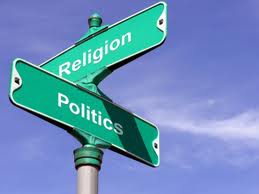 Declaration of Interest: I am an atheist.
Declaration of Interest: I am an atheist.A proper one, too - not an agnostic, in a kind of amorphous muddle as to whether there's a God (or indeed, gods) or not, but a full-nine-yards, there-is-no-God, when-you-die-that's-pretty-much-it, Jesus-was-just-an-ordinary-chap-if-he-even-existed-at-all-which-has-recently-had-doubt-cast-upon-it-as-an-historical-hypothesis kind of atheist. That said, I'm perfectly willing to reconsider this view if any decent evidence is to the contrary is thrown my way, but - until that point - atheist I shall remain.
Not that this should really make a difference to the subject under discussion, but I felt it was important to get it out of the way. I have, one might say, a vested interest in this topic. So does everyone else, of course, but we'll get to that.
Now, what do I mean by 'secular'? The conservative elements within our society - i.e. the Conservative Party, the Daily Mail, the Daily Telegraph, the vast majority of religious institutions etc. etc. - often demonise secularists as 'militant atheists'. What exactly they mean by this phrase is less clear, so I shall turn to the dictionary for assistance - the Oxford English Dictionary, specifically, just to appeal to their conservative sensibilities.
Militant: Favouring confrontational or violent methods in support of a political or social cause
Atheist: A person who disbelieves or lacks belief in the existence of God or gods
Therefore, the accusation seems to be that secularists are people who favour confrontational or violent methods in support of the lack of belief in God or gods. How exactly one could favour violent methods in favour of the lack of belief in something, I do not quite understand. I could see how one could be a militant anti-theist, which would involve violence in the active opposition to religion, but that's a different matter. Hmmm...could the conservatives possibly have made a ridiculous semantic error? Surely not! Such a thing would be impossible...
In any case, the OED defines secular as meaning 'Not connected with religious or spiritual matters'. What a secularist is, then, is someone who supports the idea that an institution - in this case, the state - should not be connected with religious or spiritual matters. The destruction of Christianity, western morality and the entirety of civilised society is by no means implied - think of it as an optional extra. Indeed, you don't have to be an anti-theist, atheist or even an agnostic to be a secularist - religious people can, and should, be in favour of a state which is not connected to or affiliated with religious groups.
The reasons for this are clear: the domination by any one religious denomination of state institutions will almost certainly lead to conditions within that state which favour that religious denomination. So, using the UK as the obvious example, the domination of the established Christian Church of England means that non-Christians (and, to a lesser degree, non-Anglican Christians) are all disadvantaged - whether they are believers or not. The only people who should not be up in arms from a practical standpoint are the CofE themselves - and surely they can see that the status quo is morally untenable.
Put simply, the CofE has too much power. It gets twenty-six bishops in the House of Lords, making it the only institution in the country which is constitutionally guaranteed a say in our lawmaking process (the relatively toothless monarchy excepted). Justifications of this presence on the grounds of membership simply don't add up - by such a calculation, the RSPB is entitled to at least twelve seats in the House itself, but the clamours for this and other popular charitable organisations to be ennobled are tellingly absent.
Religion more generally has huge powers over education - around a third of all UK schools are controlled by religious groups, allowing them a huge ability to influence our children. Faith schools don't have to teach about other religions - this is indoctrination, pure and simple - and can select their pupils on the basis of faith, allowing them to exclude what are often the less advantaged prospective pupils. The state also provides tax-relief to religious groups, running into vast amounts - although the refusal of multiple freedom of information requests on the subject prevents us from knowing just how much is stolen from the taxpayer in this way.
A secular state would prevent taxpayers' money from being used to subsidise already hugely-profitable organisations; it would remove the anti-democratic presence of twenty-six men (and they are, of course, men - no female bishops allowed, remember?) from our Parliament whose presence their is predicated purely upon their already-privileged position within a dying church; and it would end the practice of religious groups controlling our children's education.
Furthermore, secularism is the only truly effective way of guaranteeing equal rights for all. The aforementioned ban on female bishops in the CofE is just one example of how religious influence in our state institutions violates basic human rights; the fact that the head of state of this country cannot, for entirely anachronistic reasons, be a Catholic is another. A secular state would guarantee equal rights and responsibilities for all citizens, regardless of their faith or lack thereof.
It is not an example of 'militant atheism' to demand that all people be treated as equal by the constitution - it is the central principle of democracy. Until we have a secular state, the UK's claim to be democratic is a patently false one.
No comments:
Post a Comment